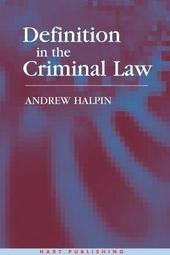
|
Definition in the Criminal Law
Hardback
Main Details
| Title |
Definition in the Criminal Law
|
| Authors and Contributors |
By (author) Andrew Halpin
|
| Physical Properties |
| Format:Hardback | | Pages:232 | | Dimensions(mm): Height 234,Width 156 |
|
| ISBN/Barcode |
9781841130712
|
| Classifications | Dewey:345.42001 |
|---|
| Audience | | Tertiary Education (US: College) | | Professional & Vocational | |
|---|
|
Publishing Details |
| Publisher |
Bloomsbury Publishing PLC
|
| Imprint |
Hart Publishing
|
| Publication Date |
13 October 2004 |
| Publication Country |
United Kingdom
|
Description
In recent years, a number of key terms of the criminal law have seemed to defy definition. Scepticism over the possibility of defining basic concepts and identifying general principles has been voiced by both judges and academic commentators. This raises broad issues of theoretical interest, but also touches on such practical concerns as the efforts made by the Law Commission to reform the law as well as wider proposals for the codification of criminal law. Furthermore, the Human Rights Act incorporates a requirement of legality under Article 7 of the ECHR, whose scope is clearly connected to our understanding of how criminal offences are defined. This book undertakes an investigation of the role and scope of definition within the criminal law, set within a wider examination of the nature of legal materials and the diversity of perspectives on law. It offers a fascinating account of how the rules and principles found within legal materials provide opportunities for responding to, rather than merely following the law. In the light of this account, the book takes issue with some of the established views on the roles of judges and academics and, in a series of case studies, examines some of the apparently intractable problems concerning the definition of theft, and changes to the definition of recklessness recently introduced by the House of Lords in Gemmell and Richards. More specific objectives of the book involve challenging the conventional intellectual apparatus of the criminal law; demonstrating how general theoretical insights on legal reasoning can assist with the practical problems of defining criminal offences; identifying where different features of the process of definition call for different practical responses in applying the law; clarifying the uses of definition in the work of the judiciary and law reformers; and, determining realistic expectations for the principle of legality within the criminal law.
Author Biography
Andrew Halpin is Professor of Legal Theory in the School of Law at Swansea University.
Reviewsclear, careful and very well written...The exploration of how the courts of England and Wales developed a chaotic jurisprudence of recklessness has no equal in the literature that I know of. This is a very useful material for academics and students alike. -- Victor Tadros * Social and Legal Studies Vol 15, No 2 * ...not only stands up to multiple readings, but necessitates them...Readers of many different stripes should find something of interest. -- Michael Plaxton * The Modern Law Review * This is a very valuable contribution to the arguments about recklessness and the test for dishonesty, which academics and law students will value. -- Rob Jerrard * Internet Law Book Reviews *
|